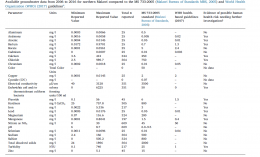RWSN Library

Author
Holm, R. H., Kunkel, G. and Nyirenda, L.
Year of Publishing
2018
Publisher
Groundwater for Sustainable Development, 2018, 7, pages 157-163.
Institution
Mzuzu University
Where are the rural groundwater quality data for the assessment of health risks in northern Malawi?
A thought leadership piece
Description:
Global emphasis on drinking water quality, but is it practical in Malawi?.
• Determine rural groundwater quality data and local capacity in northern region.
• Conducted systematic review of available data and interviews.
• Limited data compared to national and WHO guidelines, need further investigation.
• Varied engagement in government capacity and lack of laboratory infrastructure
The Sustainable Development Goals place a strong emphasis on water quality. However, what is the local capacity to ensure safe water availability in a low-income country such as Malawi where groundwater is still the primary source of drinking water for rural communities? We conducted a systematic review of peer-reviewed literature containing primary data on groundwater used for drinking water in northern Malawi published over the period from 2006 to 2016. We also interviewed district, regional, and national government representatives supporting the water quality management sector. The results showed that the government cannot tell if groundwater is safe for drinking in the northern region of Malawi. Current literature provides only minimal information on groundwater quality for the assessment of human health risks, and there are limited laboratory services. Nitrate and pH were the most commonly available data. There is evidence that the following constituents need further investigation about possible human health risks: antimony, arsenic, barium, calcium, chloride, color, cyanide (CN-), Escherichia coli and/or thermotolerant coliform bacteria, fluoride, iron, lead, manganese and turbidity. Water quality monitoring needs to especially consider mining activities, including uranium. Varied levels of engagement appear in that while there is some strengthens in the national government capacity, as this is decentralized to districts weaknesses are most evident with no laboratories and either limited data or no data in the case of the most rural districts. Malawi needs to build human capacity, laboratory infrastructure and a publicly available water quality database under national government regulatory oversight with real time monitoring data available to both district and national government decision makers, practitioners and water users to determine groundwater quality for the assessment of possible health risks.
Bibliographical Information:
Holm, R. H., Kunkel, G. and Nyirenda, L. (2018) Where are the rural groundwater quality data for the assessment of health risks in northern Malawi?. A thought leadership piece , Mzuzu University , Groundwater for Sustainable Development, 2018, 7, pages 157-163.
DOWNLOADS (32)
Where are the rural groundwater quality data for the assessment of health risks in northern Malawi?
 Google Übersetzer
Google Übersetzer
